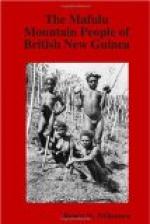As regards both movable effects and gardens and bush land there must be endless occasions for dispute. How are the movable things to be divided among the inheritors, and, in particular, who is to take perhaps one valuable article, which may be worth all the rest put together? How are questions of doubtful claims to heirship to bush and garden land to be determined? How is the joint ownership of the gardens to be dealt with, and how is the work there to be apportioned, and the products of the gardens divided? How are the mutual rights of the bush land to be regulated, and especially what is to happen if each of two or more joint owners desires to clear and allocate to himself as a garden, a specially eligible piece of bush? Such situations in England would bristle with lawsuits, and I tried to find out how these questions were actually dealt with by the Mafulu; but there is no judicial system there, and the only answer I could get was that in these matters, as in the case of inter-community bush boundaries and personal bush boundaries, disputes were practically unknown; though it was pointed out to me, as regards bush land, that the amount of it belonging to any one family was usually so large that crowding out could hardly arise.
If a man dies without male descendants in the male line, then, subject perhaps to some sort of claim of his daughters, if any, to share in his movable effects, his property goes to his nearest male relative or relatives in the male line. This would primarily be his father, if living, but the father could hardly be the inheritor of anything but movable things and perhaps garden land, as the deceased could not be the owner of bush land during the lifetime of his father. Subject as regards movable things and perhaps gardens to this right of the father, the persons to inherit everything would be deceased’s brothers and the male descendants in the male line of any such brothers who had died; or in default of these it would be the father’s (not the mother’s) brothers and their male descendants in the male line, and so on for more distant male relatives, every descent being traced strictly in the male line only, on a principle similar to that above explained.
Male infants, by which term I mean young children, there being of course no infancy in the defined sense in which the term is used in English law, like adults, may become possessed of property by inheritance as regards bush and garden land, and by inheritance or otherwise as regards movable property, but they would hardly be likely to be the owners of houses; and the descent from these infants is the same as that in the case of adults.




